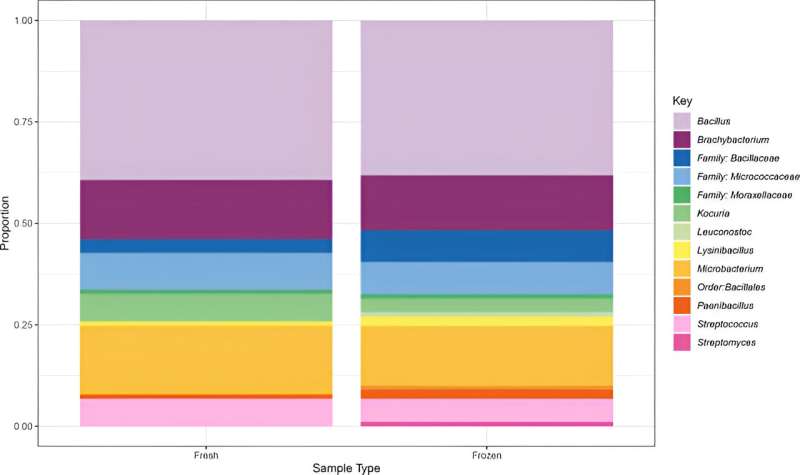This article has been reviewed according to Science X's editorial process and policies. Editors have highlighted the following attributes while ensuring the content's credibility:
fact-checked
trusted source
proofread
Bacterial test for raw, organic milk may require more precision

Cornell food scientists show that a standard quality test used for raw, organic milk is insufficient for distinguishing between specific groups of bacteria, suggesting that the criteria for determining milk quality at processing plants need to be updated.
Their work was published Jan. 20 in the Journal of Dairy Science.
"Testing milk should not be one size fits all," as tests should be used appropriately to give the best feedback to dairy producers, said lead author Renee Lee '21, a master's student who works in the laboratory of Martin Wiedmann, Ph.D. '97, the Gellert Family Professor in Food Safety in the College of Agriculture and Life Sciences (CALS).
If the current test causes milk to be downgraded or rejected by processors, the farmers will earn less money or not get paid at all.
The present test, called the Laboratory Pasteurization Count (LPC), looks for thermoduric bacteria (strong enough to endure pasteurization) and does not differentiate whether bacteria form spores or not—a key factor in determining both the quality of milk and how producers need to address milk-production hygiene.
The latest scientific literature on this test is more than two decades old.
"You have to know what's in the milk before you can troubleshoot it and develop the right corrective action," Lee said. "There are different ways to address it."
Some types of thermoduric bacteria that form spores are ever-present in the farm environment, found in bedding, feed and the air, Lee said. These types of bacteria can cause dairy products like milk and cheese to spoil, which contributes to food waste.
Non-sporeforming thermoduric bacteria can be found in improperly cleaned milking equipment and can be addressed by producers with improved maintenance and sanitation. Distinguishing between these two groups of thermoduric bacteria is important to reducing the time organic farmers spend troubleshooting elevated LPC results.
When dairies deliver organic milk to processors, the milk is sometimes tested for thermoduric bacteria using LPC. Under current standards, if thermoduric bacterial counts are high, the milk can be downgraded or even rejected by the processor.
In the paper, the researchers said that despite the test being used as a proxy for levels of bacterial spores in raw milk, there is limited knowledge of the types of organisms identified by this test in raw milk.
Organic milk is an important economic component for the dairy industry. New York state, for example, has more than 650 certified organic milk producers (as of June 2023) with more than half certified by Northeast Organic Farming Association of New York.
"We're giving organic farmers the knowledge they need to make high-quality raw milk and for it to be economically viable," said senior author Nicole H. Martin '06, M.S. '11, Ph.D. '18, assistant research professor in dairy foods microbiology and the associate director of the Milk Quality Improvement Program in the Department of Food Science (CALS). "It will make a better dairy product in the end."
More information: Renee T. Lee et al, Troubleshooting high laboratory pasteurization counts in organic raw milk requires characterization of dominant thermoduric bacteria, which includes non-sporeformers as well as sporeformers, Journal of Dairy Science (2024). DOI: 10.3168/jds.2023-24330
Provided by Cornell University





















